

Research at MD Anderson. MD Anderson’s history is filled with stories of physicians, scientists and others who observed a problem and worked to solve it.
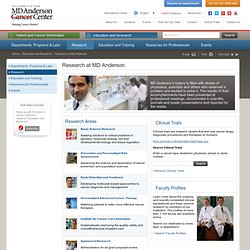
The results of their accomplishments have been presented at professional meetings, documented in scientific journals and poster presentations and reported by the media. Research Areas Basic Science Research Seeking solutions to critical problems in genetics, molecular biology, cell and developmental biology and tissue regulation Sponsored Research Administration for all grant proposal review, electronic submission and contract facilitation with sponsors on behalf of MD Anderson.
Faculty Profiles Learn more about the ongoing and recently completed clinical, translational and basic science research by members of our institution. Search our database by name, topic or department. Search Faculty Profiles © 2014 The University of Texas MD Anderson Cancer Center. Molecular Genomics. The Molecular Genomics Core (MGC) is a single resource for research that requires analysis of the human genome or transcriptome, the set of all RNA molecules.
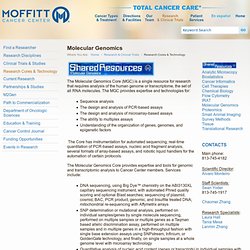
The MGC provides expertise and technologies for: Sequence analysis The design and analysis of PCR-based assays The design and analysis of microarray-based assays The ability to multiplex assays Understanding of the organization of genes, genomes, and epigenetic factors The Core has instrumentation for automated sequencing, real-time quantitation of PCR-based assays, nucleic acid fragment analysis, several formats of array-based assays, and robotic liquid handlers for the automation of certain protocols.
The Molecular Genomics Core provides expertise and tools for genomic and transcriptomic analysis to Cancer Center members. Services include: Study links carcinogens to cancer stem cells – but spinach can help. CORVALLIS, Ore. – Researchers at Oregon State University have for the first time traced the actions of a known carcinogen in cooked meat to its complex biological effects on microRNA and cancer stem cells.
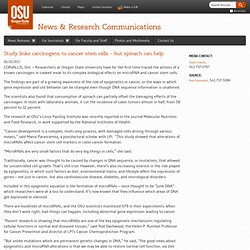
The findings are part of a growing awareness of the role of epigenetics in cancer, or the ways in which gene expression and cell behavior can be changed even though DNA sequence information is unaltered. The scientists also found that consumption of spinach can partially offset the damaging effects of the carcinogen. In tests with laboratory animals, it cut the incidence of colon tumors almost in half, from 58 percent to 32 percent.
The research at OSU’s Linus Pauling Institute was recently reported in the journal Molecular Nutrition and Food Research, in work supported by the National Institutes of Health. “Cancer development is a complex, multi-step process, with damaged cells arising through various means,” said Mansi Parasramka, a postdoctoral scholar with LPI. One disease, two mechanisms - Press Release - Prostate cancer in younger patients is triggered by a different mechanism than in older men. New model of tumour development in young men with prostate cancerCredit: Joachim Weischenfeldt / EMBLClick to enlarge In a nutshell: Depending on the age of the patient, prostate cancer can be caused by two different mechanisms The mechanism leading to prostate cancer in younger patients is triggered by androgen hormones and induces important rearrangements in the genome of the tumour Understanding how prostate cancer is triggered in younger men could have widespread clinical consequences for diagnosis and treatment While prostate cancer is the most common cancer in elderly Western men it also, but more rarely, strikes patients aged between 35 and 50.
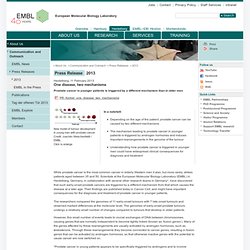
Scientists at the European Molecular Biology Laboratory (EMBL) in Heidelberg, Germany, in collaboration with several other research teams in Germany*, have discovered that such early-onset prostate cancers are triggered by a different mechanism from that which causes the disease at a later age. Additional resources Source Article. National Cancer Institute: Epigenomics and Epigenetics Research - EGRP. Overview Illustration of Epigenetic MechanismsClick to enlarge. Epigenetics focuses on processes that regulate how and when certain genes are turned on and turned off, while epigenomics pertains to analysis of epigenetic changes across many genes in a cell or entire organism.
Epigenetic processes control normal growth and development and this process is deregulated in diseases such as cancer. Diet and exposure to environmental chemicals throughout all stages of human development among other factors can cause epigenetic changes that may turn on or turn off certain genes. Changes in genes that would normally protect against a disease, as a result, could make people more susceptible to developing that disease later in life. The epigenome can mark DNA in two ways, both of which play a role in turning genes off or on.
Return to Top Funded Projects. Professor Robert Brown. Robert Brown is Professor of Translational Oncology and has a joint post between Imperial College London and The Institute of Cancer Research (ICR).
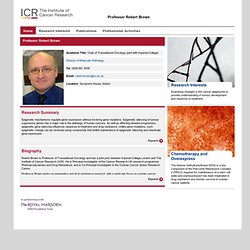
He is Principal Investigator of the Cancer Research UK research programme, Pharmacodynamics and Drug Resistance, and is Co-Principal Investigator in the Ovarian Cancer Action Research Centre. Professor Brown works on epigenetics and drug resistance research, with a particular focus on ovarian cancer. Working closely with clinical trials groups, in particular the Scottish Gynaecological Clinical Trials Group, he and his team have shown that in ovarian cancer, aberrant DNA methylation and epigenetic silencing of genes in tumours before chemotherapy can predict response to chemotherapy, while acquired methylation of other genes at the time of relapse following chemotherapy is associated with patient survival.
Programa de Epigenética y Biología del Cáncer.